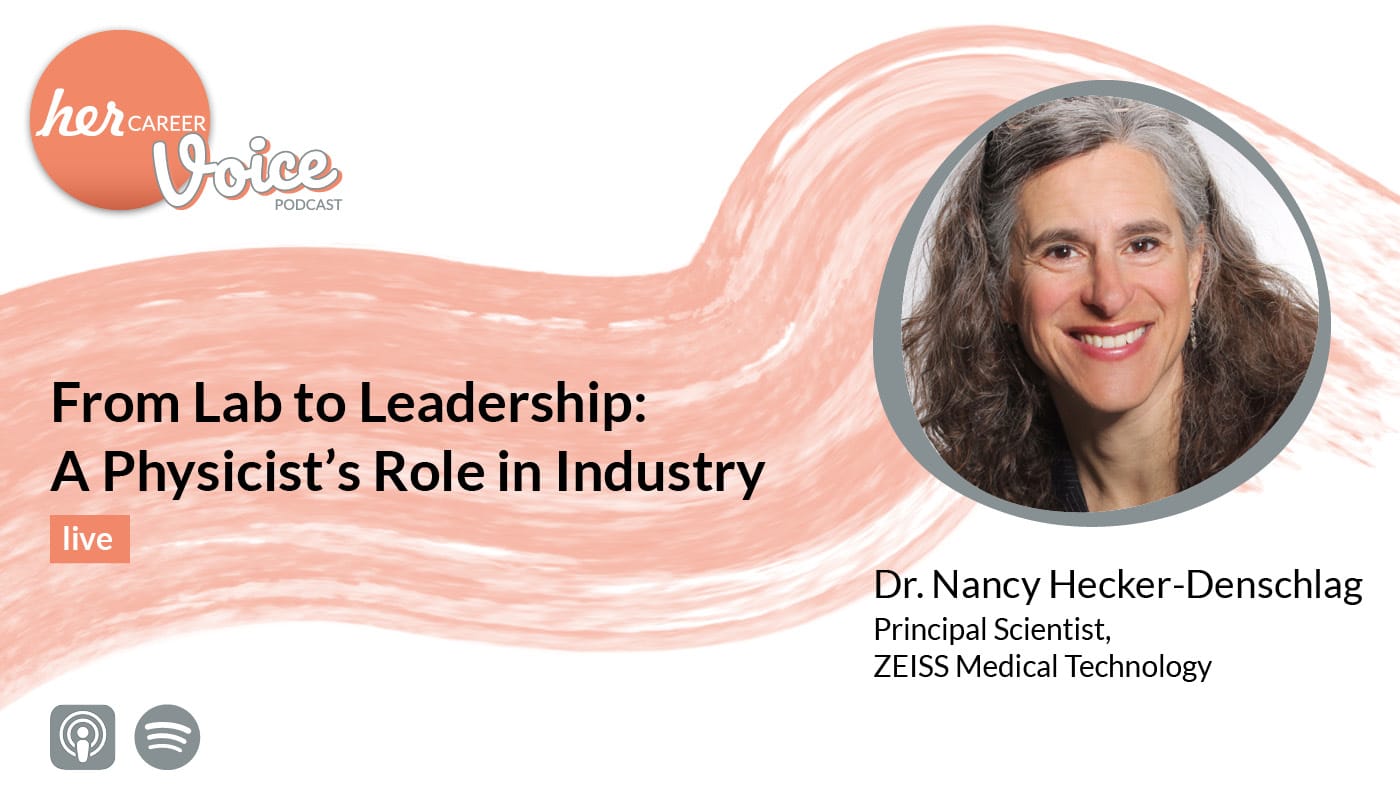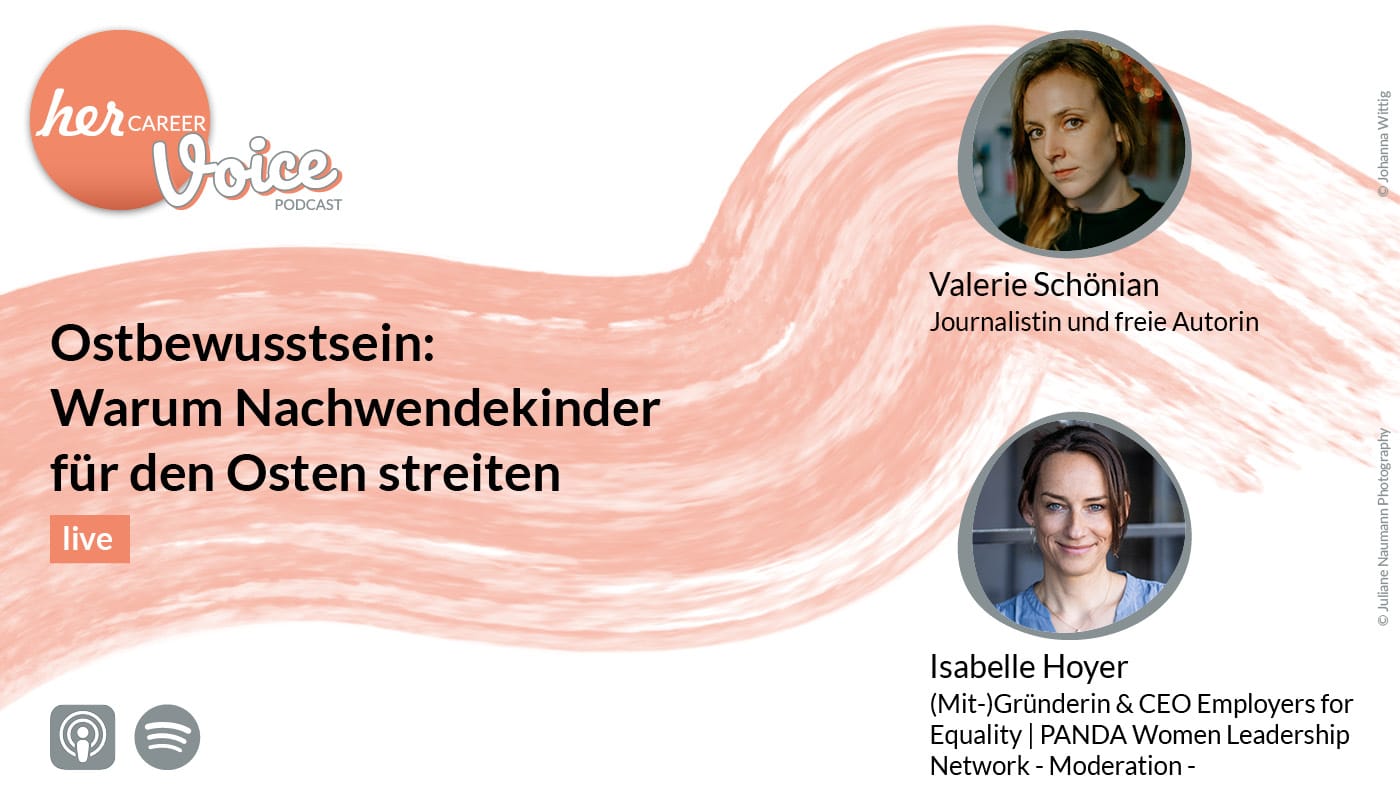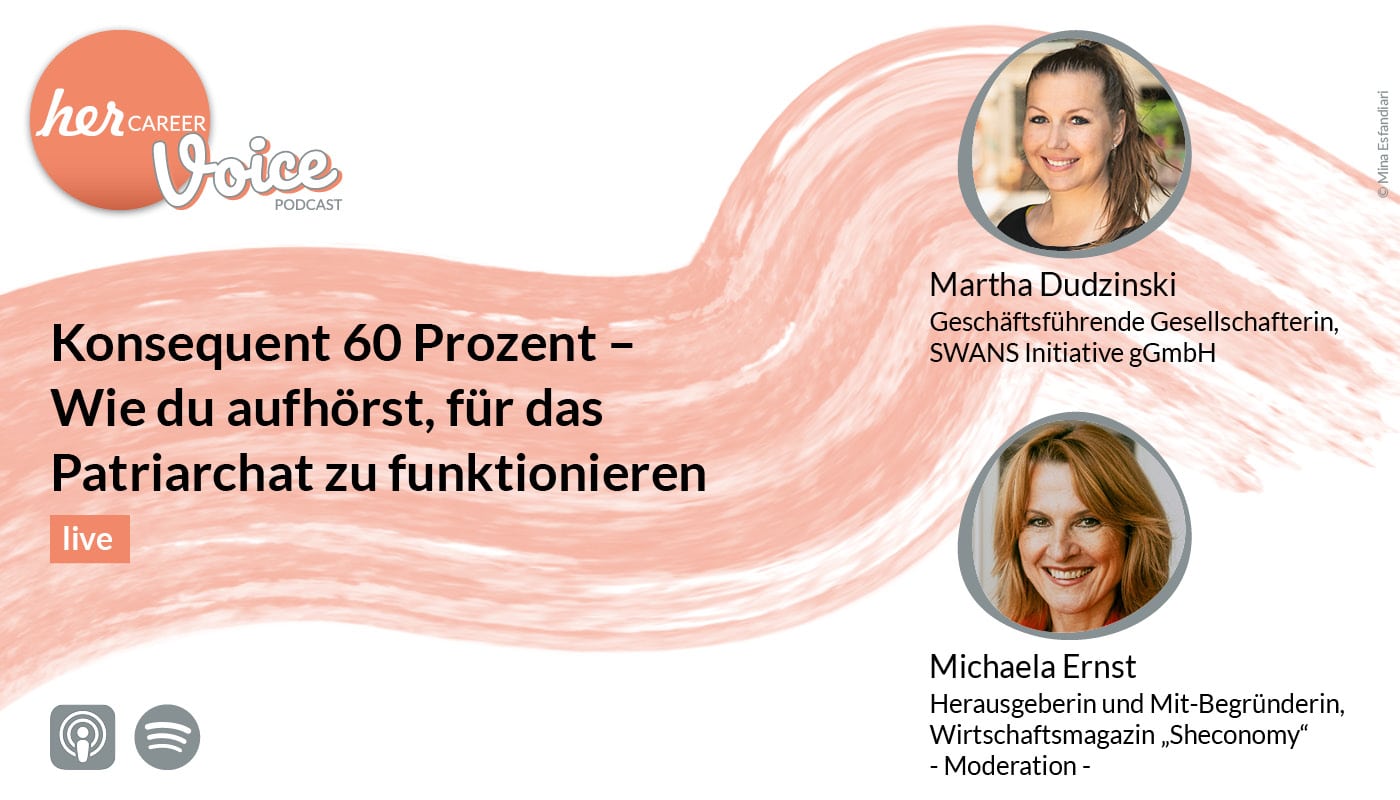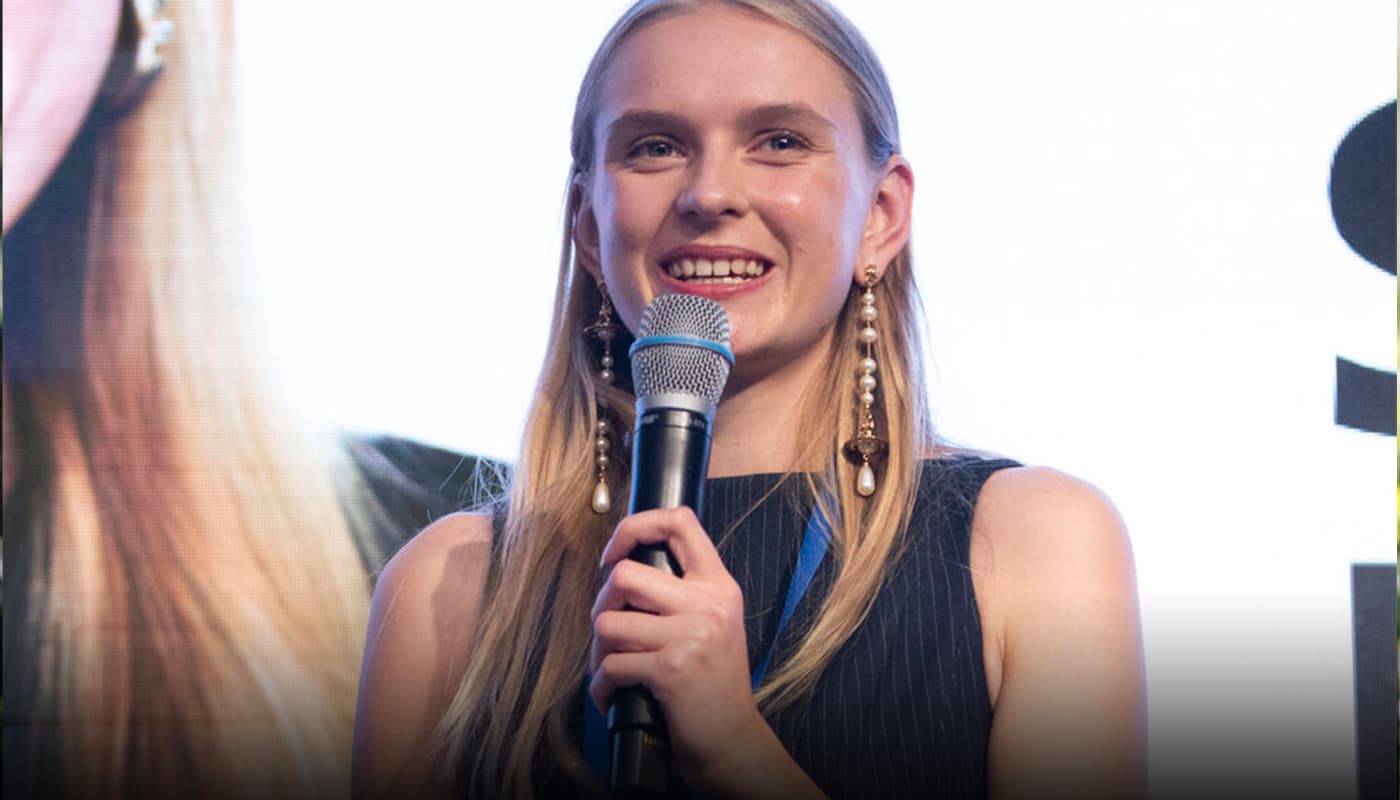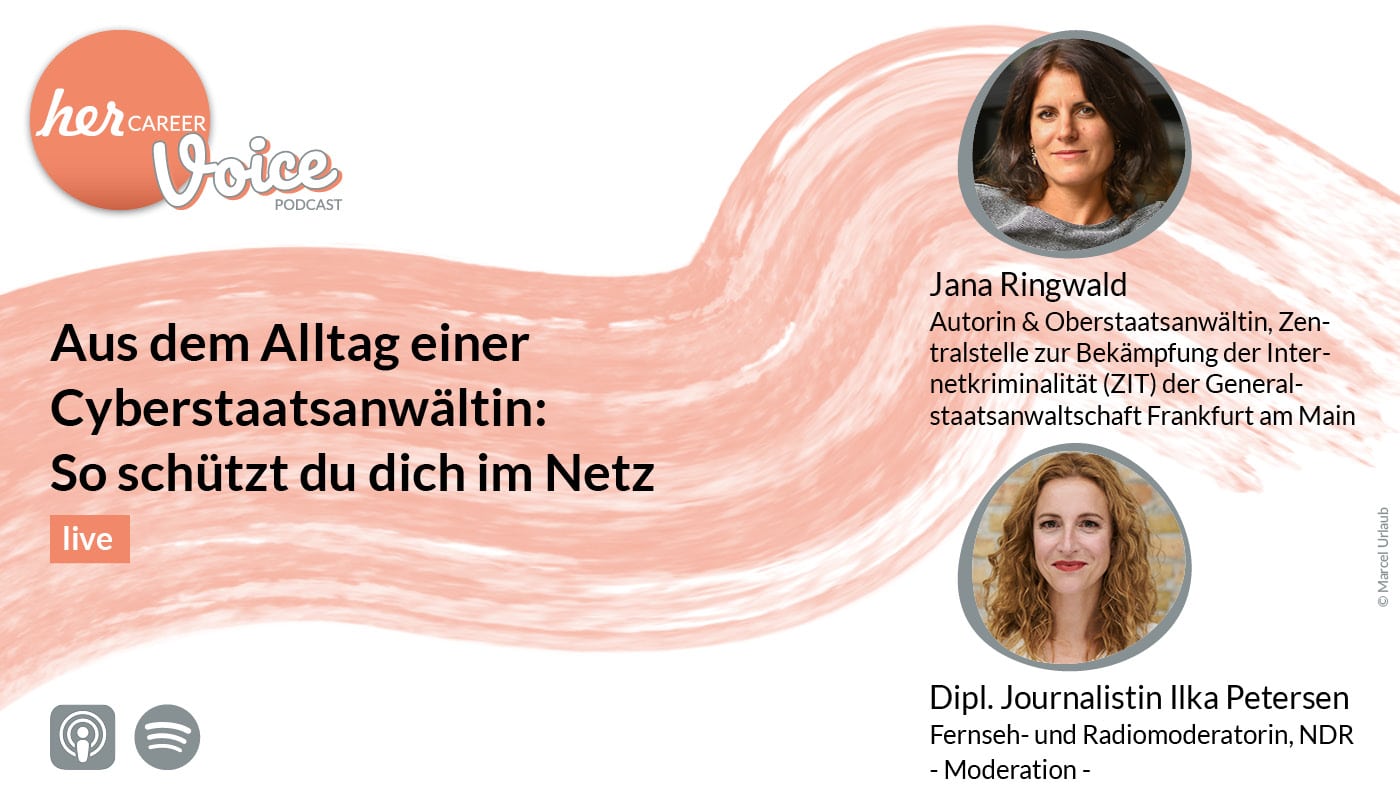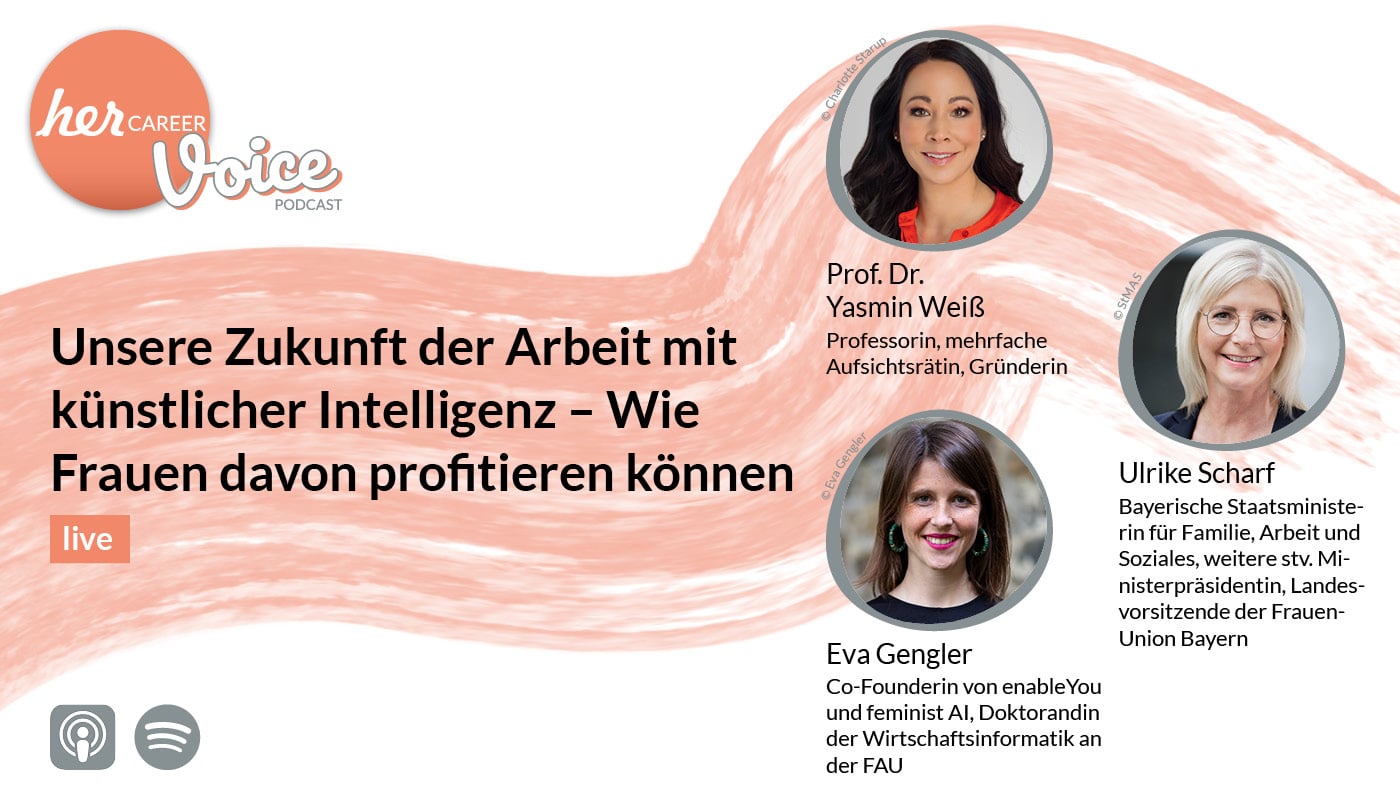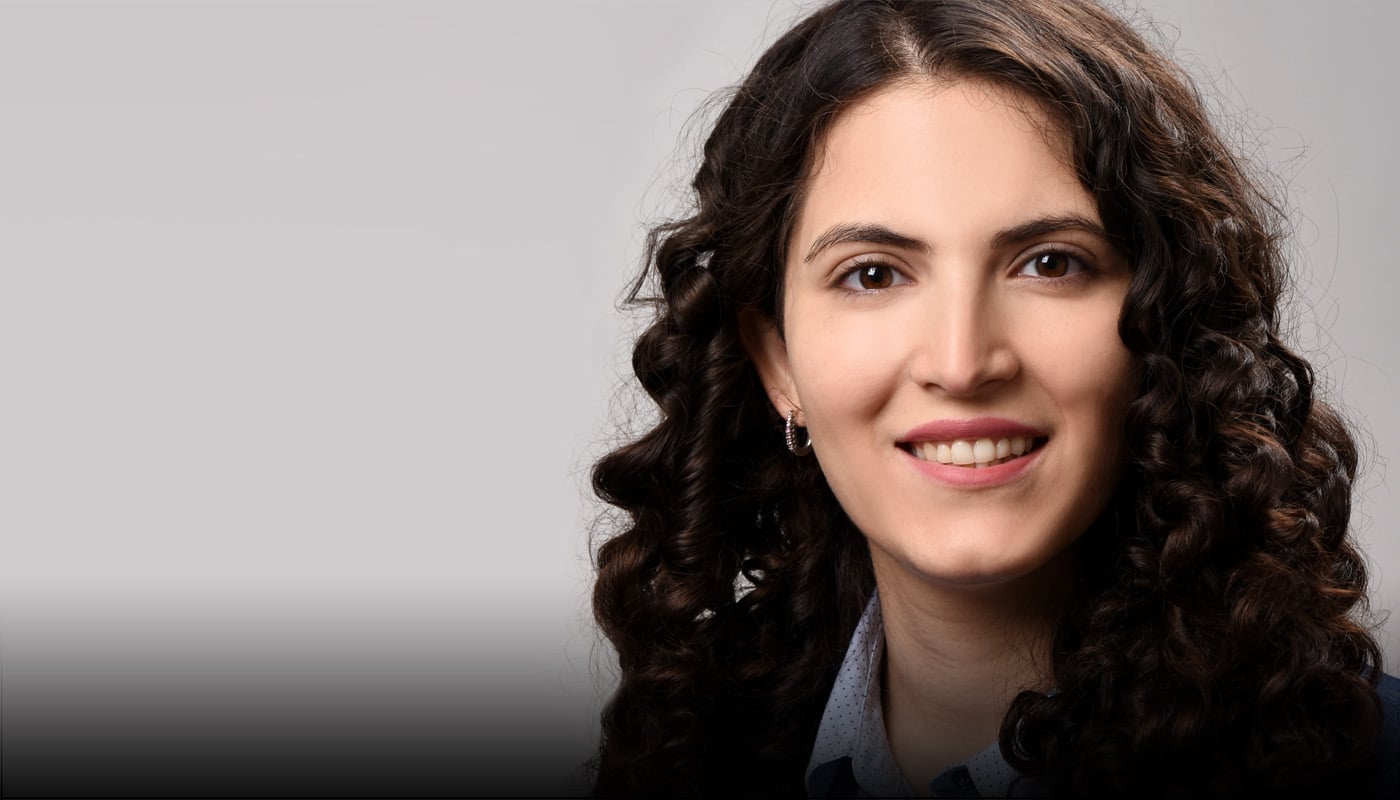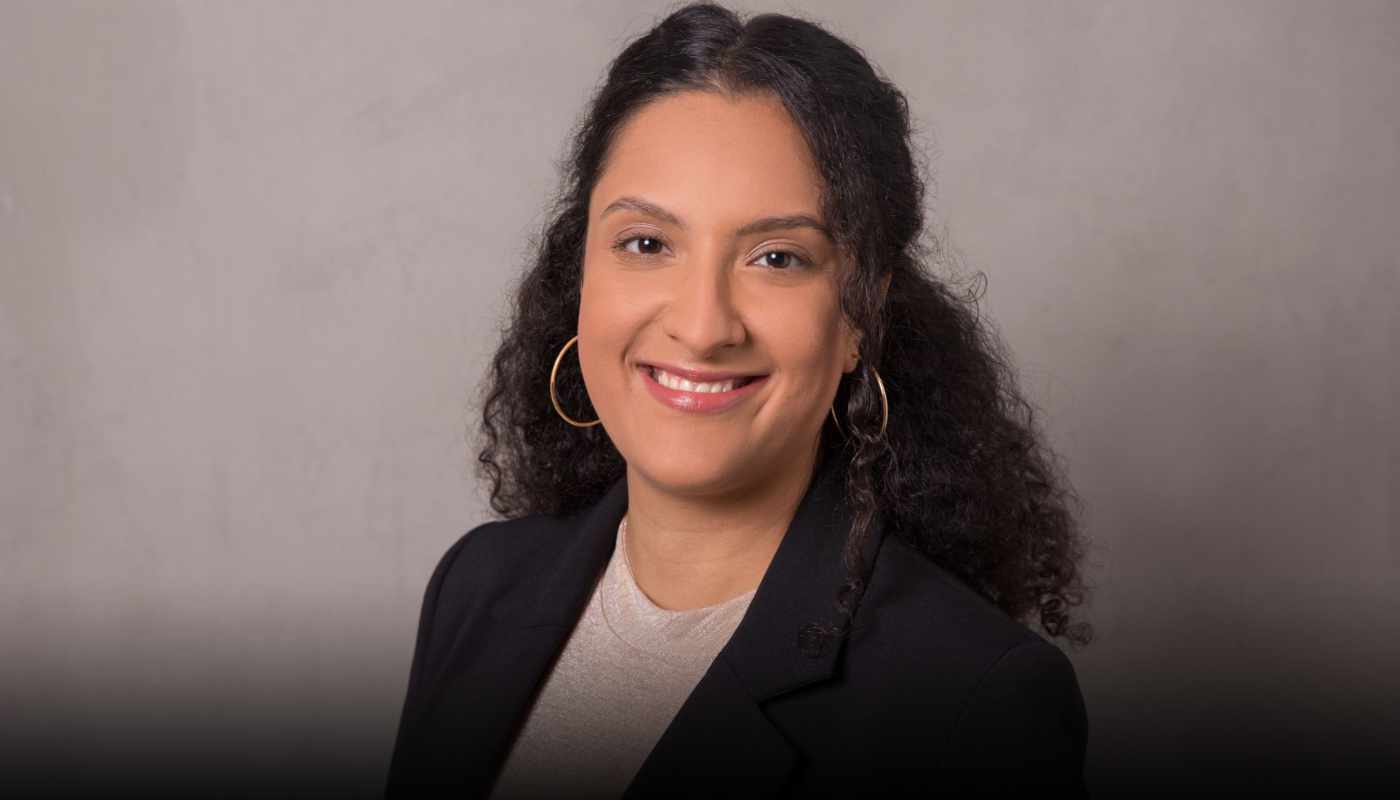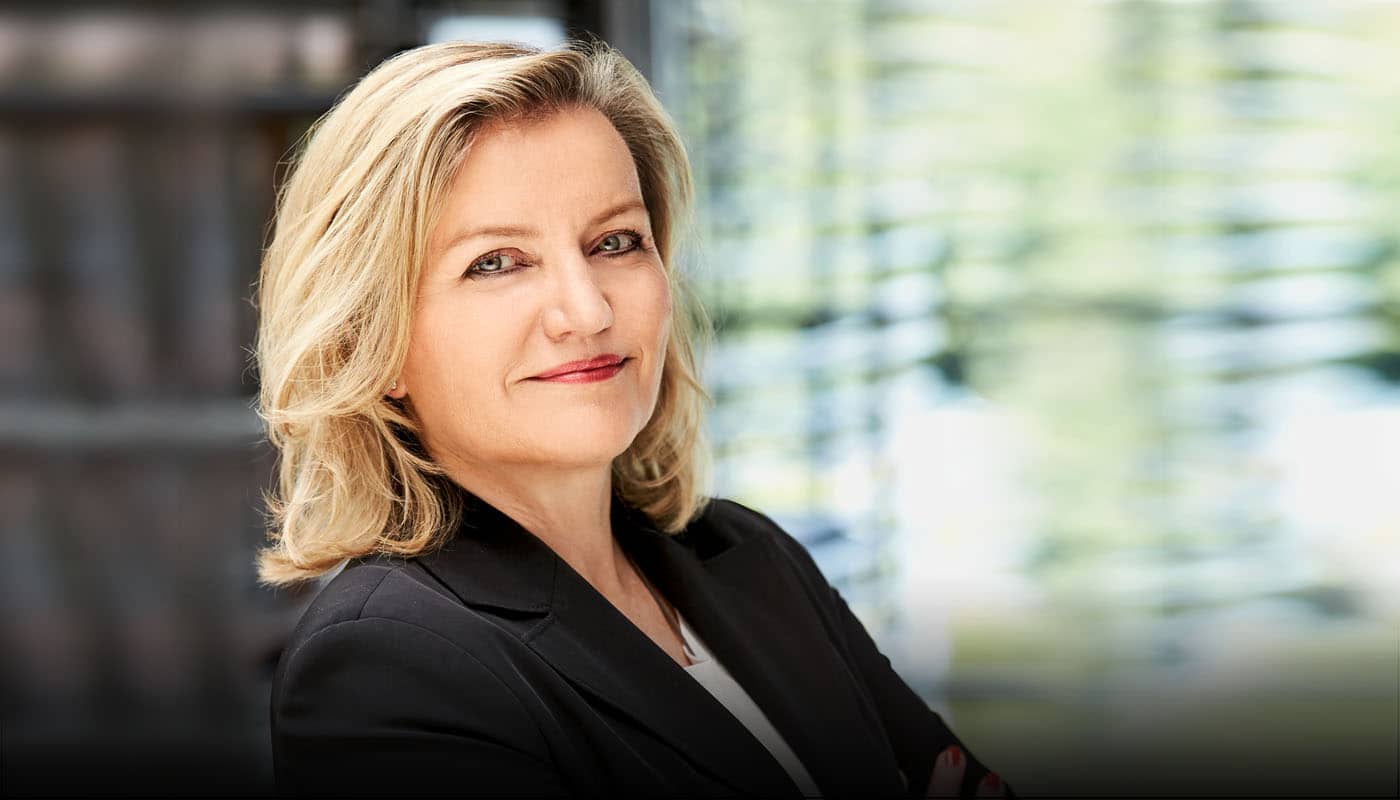Dr. Nancy Hecker-Denschlag is passionate Scientist a mother of two and currently working in Research and Development at ZEISS Medical Technology.
At 50, she had lost her job and many in her community told her: You won’t find a job at this stage in your life and career. Well, spoiler: she found more than a job, she found place to thrive as a scientist, as a leader. She has become a passionate advocate for STEM as a career path, way beyond academia.
Nancy is also one of the protagonists of ZEISS RealTalk – a digital format that offers authentic insights into how the company works. ZEISS RealTalk offers authentic insights into how the company works. Employees share their personal job experiences and first-hand stories – honest and unfiltered. For herCAREER, Inkeri Klomsorf, Head of Portfolio Management at ZEISS Medical Technology, invited Nancy to share her story once more, this time with a live audience. Hear Nancy talk about her work, her part-time leadership position and the attributes of working environment that fosters safety and innovatio

![]() Subscribe to the herCAREER podcast on Apple Podcasts, Spotify, or wherever you listen to your podcasts.
Subscribe to the herCAREER podcast on Apple Podcasts, Spotify, or wherever you listen to your podcasts.
Topics
Career & Job Application | Leadership & Communication | Science, Digitalization & Technology
Details about the speaker
- Work 50+: Dr. Nancy Hecker-Denschlag openly discusses the challenges and prejudices she faced when she lost her job at 50 – and how she found a new professional home at Zeiss, proving that it’s never too late to start a new role in an environment, where age and experience are valuable assets.
- Innovation through Diversity: As a physicist in R&D, Nancy applies her scientific expertise in an industrial setting. She has learned the importance of teamwork and knowledge sharing to develop innovative solutions: „We work together to develop the best product. It only works when everyone shares their knowledge and is good at what they do.“
- Leadership and Role Models: Nancy believes in the power of role models, especially for women in science and technology. There still aren’t enough! As a leader, she believes in supporting others to help them reach their full potential.
This Episode was recorded during the herCAREER Expo 2024.
[00:00:00] Nancy Hecker-Denschlag: Everybody has to figure out what is that thing that you do different or better than other people? And it could be this little thing. I mean, it wasn’t like I was solving Schrödinger’s equation or anything, but just asking questions. I gave up on that I might feel stupid thing, I might look stupid, but if I don’t know the answer, that’s worse.
[00:00:29] Kristina Appel: Welcome to the HerCareer podcast. Are you interested in current issues in business, science, politics and society, specifically from a female perspective? Or would you like personal insights into the day-to-day work of people and companies that are facing up to social and economic changes? Well, you’ve come to the right place. Dr. Nancy Hecker-Denschlag is a physicist, a mother of two and currently works in Research&Development at Zeiss Medical Technology. A few years ago, at the age of 50, Nancy had lost her job, and many in her community told her, you won’t find another. Not at this stage in your life and career. Well, spoiler, she found more than a job. She found a place to thrive as a scientist and as a leader. She’s become a passionate advocate for careers in science beyond academia. Nancy’s also one of the protagonists of Zeiss RealTalk, a digital format in which employees share their personal work experiences and firsthand stories. At HerCareer Expo, the company held their first ever RealTalk live. Presented by Inkeri Klomsdorf, Head of Portfolio Management at Zeiss. Listen to Nancy‘s honest and unfiltered view on part-time leadership, on fostering team work and innovation, and the rewards of being a scientist in a corporate setting.
[00:02:05] Inkeri Klomsdorf: Welcome, everybody. So, my name is Inkeri. I work for Zeiss since 15 years now. I am heading the digital portfolio for the Meditec company, so for the health tech sector and in my, let’s say, spare time, my other hobby is supporting the employer branding team also with talks like that. But enough said. I’m going to introduce you to a very great lady. She also works in Zeiss and we’re doing a format which is called RealTalk. Some of you might know it from postings. We did a RealTalk series with a lot of employees. It’s great. It’s about emotions. It’s about how it really is. It’s not polished about, hey, you need to say something great about your employer. No, it’s about really the, I would say, the deep things. And we posted snippets online, but now we’re doing the actual first live RealTalk with her. So I’m actually super excited and welcome on stage Nancy. So before we say anything about you, let’s quickly watch the video.
[00:03:05] Einspieler – Nancy Hecker-Denschlag: I had just turned 50. Lost my job. You know, I was told that 50 is the border in Germany where you can no longer get a job.
[00:03:15] Inkeri Klomsdorf: Wow. Nancy, that’s an icebreaker, I would say. So that’s only a super small snippet of one of the videos. But tell us more about that. That seems to be so kind of like an end game, right? I mean, you lose your job at 50.
[00:03:30] Nancy Hecker-Denschlag: That’s what I thought. I really thought. We know that it was not the case, but I was told, I mean, I’ve been living in Europe and German-speaking countries now for 30 years. And I was told, my God, you’re never going to get a job. You’re 50. And I was like, it’s not the case.
[00:03:50] Inkeri Klomsdorf: Yeah. It wasn’t the end. That’s good. But how does that feel to lose the job and then kind of like getting the feedback that this is now it?
[00:04:00] Nancy Hecker-Denschlag: I wasn’t super concerned. I mean, I’m a PhD physicist and I figured someone out there could use my talents. But I was sort of like, my God, everyone’s telling me maybe it’s true. But in the end, I ended up at Zeiss and I have a great career there. So it wasn’t bad. There was no discrimination based on age. But it was a little nervous at that point.
[00:04:26] Inkeri Klomsdorf: So tell us more about yourself. Who are you?
[00:04:29] Nancy Hecker-Denschlag: I am, as I just said, a Ph.D. physicist. I did my entire education in the United States, and I moved to Europe 30 years ago. And I would say I’m a physicist. I’m a mother. And I am driven to encourage young people to do science. Those are the three things that I said.
[00:04:52] Inkeri Klomsdorf: Wow. And I don’t want to ask about your age. That’s why I’m asking, how long is this ago? When you lost your job.
[00:04:58] Nancy Hecker-Denschlag: So I’m approaching 60.
[00:05:03] Inkeri Klomsdorf: So you are almost ten years with Zeiss now?
[00:05:04] Nancy Hecker-Denschlag: No, no, I’ve been with Zeiss six years, because it took me a while before I came to Zeiss. At the time. Yeah.
[00:05:12] Inkeri Klomsdorf: Let us know, what was a big turning point in your career? so anything that you wished to know earlier at a certain point?
[00:05:20] Nancy Hecker-Denschlag: Yeah. I didn’t know what I was good at. I mean, I was a physicist. I like doing that. And I had been doing research. I was going to become a professor. I was at the LMU in München, and I wanted to become a professor. And then things – there’s a lot of things that changed. And I ended up going to a company and I did research there, and it was basically like being a professor. But then I became a system engineer and I had a whole big team and I realized what my golden thing was. And that is: I am very good at knowing lots of technology and bringing those people to work together. And that was when I realized that’s what I can do.
[00:05:58] Inkeri Klomsdorf: I mean, that’s great that you didn’t, I would say, end up as researcher. Not that it’s bad, but then you found it different.
[00:06:04] Nancy Hecker-Denschlag: It’s an important aspect. I realized I’m very good at knowing a little about lots of things and that I can make think people work together. And that was my click moment.
[00:06:17] Inkeri Klomsdorf: Would you, if you knew that earlier, would you have pursued that earlier, or was it at the right time?
[00:06:22] Nancy Hecker-Denschlag: I don’t know. I think if I had known it earlier, it might have been better for me because, you know, I wasn’t always so sure of myself. But I realize what I can really do, what my passion is. Then I can fly. I wasn’t flying. I was doing good, but I wasn’t flying. And then when I realized what I could do, it was better. That’s beautiful.
[00:06:41] Inkeri Klomsdorf: That’s beautiful. But we’re glad that you had this.. let’s have a look at the second snippet. We brought your second snippet.
[00:06:49] Nancy Hecker-Denschlag: I’m lucky to have been born this time. I am, you know, a woman scientist who can do what she wants. I can choose to have a family. I can live where I want to live. I’m free to make decisions and free to dream about the things I want to do. I have never worked at a company before that had so many women working at the company. When I worked for other companies, basically, almost always, I was alone. Or there was one other woman scientist. And at Zeiss it’s just tons of women. It just looks like society. I like that. It’s also a friendly environment. Maybe if you’re higher up at Zeiss, it’s different. But where I’m working, you know, it’s like people want to work together to get something to work, you know, that allows the people to, you know, take the ball and run.
[00:07:37] Interviewer: But, you know, everybody says they have a great team.
[00:07:39] Nancy Hecker-Denschlag: Yeah, but I mean, you got to walk the talk, as we say at Zeiss. And it’s not always the same. I’ve worked in environments where it was very competitive, where people, you know, are kind of coming from behind and trying to make you trip. And it’s not like this at Zeiss. I think everyone feels good in our team. People want to work with us. If you go around and ask who wants to work on our team, they want to work for us. So obviously we must have a good team. Everyone wants to work with us.
[00:08:08] Inkeri Klomsdorf: So that was a bit of a longer snippet, but I think it is beautiful because I actually got goosebumps when watching it, because when you say, that it from a place where you know different. It’s not just that you said, I heard there’s differences or I heard that other companies work different. You’re like, no, this is real. So it’s so authentic. I guess this is the word I was searching for. But so what would you say makes your team so great? I mean, you said everyone says we have a great team or I have a great team, but why is it so great?
[00:08:42] Nancy Hecker-Denschlag: So I thought a lot about this, and that is because we have experts, people who are great at what they want to do and they want to share it. It’s not like they’re holding back their secrets. So we have teams that are doing all these different things and they work together to make something beautiful. And I love that. I said that I love it there, but I do love it because there’s so many fantastic people and that’s the big thing. They share it. That’s a big thing. It’s not like they’re holding back. They want to work together to make the best product. So I develop microscopes for eye surgery and we have optics people, we have application engineers, we have programmers. We all work together to make that product as best as possible. And then it only works when everyone’s sharing their information and they’re good at what they do and we work together. Those are the three things.
[00:09:34] Inkeri Klomsdorf: So you’re actually also a lot of this sharing personality that you say, I’m not holding back with my experiences and my knowledge.
[00:09:41] Nancy Hecker-Denschlag: And it’s it’s good to talk about things. It’s very important to the experiences that you have. It’s it’s good to discuss, what did you do, how do you do it, and that works also with the team.
[00:09:52] Inkeri Klomsdorf: Yeah, I think that’s a great way to answer. Why is your team special or good? Because everyone says I have great people, because obviously no one says something bad about their teams.
[00:10:02] Nancy Hecker-Denschlag: They’re great people who want to work together. It doesn’t always happen like that.
[00:10:07] Inkeri Klomsdorf: So, knowing that, you said that you have a great team, and why it is so great, what drives you and everyday work?
[00:10:13] Nancy Hecker-Denschlag: As I said, I did design microscopes for eye surgery and I want to help patients and surgeons have a better patient outcome and help people. We put technology into a microscope. The surgeon uses it to help people who have a disease or a problem. And that’s such a great feeling when you see someone gets healed because a surgeon is able to correct something in an eye. It’s a great feeling. It’s great to work with the surgeons and they say, oh my God, you implemented that great thing that I wanted in the microscope and now I can do…
[00:10:47] Inkeri Klomsdorf: You’re that genius that did that?
[00:10:48] Nancy Hecker-Denschlag: No, no, no. The team. The team has done it. And that’s what I love.
[00:10:55] Inkeri Klomsdorf: I can totally relate to that. You know, I’m not even medical or technical, but it’s when you have a purpose and you realize what I’d do, maybe indirect, but what I do actually helps patients and surgeons performing a better job, having more people with good eye sight out there. That’s just I mean, that drives you, too?
[00:11:18] Nancy Hecker-Denschlag: I feel like we’re making a difference. It’s just not making money. It’s actually contributing to society.
[00:11:25] Inkeri Klomsdorf: Coming back to Zeiss and how we work, how is that topic of leadership understood? You just let us in on that turning point that you also found out you’re not only a great researcher, you’re also good at connecting people and driving people and making them kind of run to the same goal. So what is it about this leadership? How do you perceive Zeiss to how we do this? And what’s different maybe from other companies?
[00:11:48] Nancy Hecker-Denschlag: I get heard if I talk to people here and listen and we, together, we’re able to make it better. Leadership is standing up and standing for what you believe. I mean, also for women within Zeiss. I have women mentees. I think it’s important to help them figure out their way in their careers. So it’s a leadership question. Leading means also hearing and helping them.
[00:12:17] Inkeri Klomsdorf: I once heard like ten years ago, people never leave a job. They always leave a leader. And that resonated so strongly with me that I always told myself, I’m never going to be that leader that makes people leave, although you most probably never find out. But still, it’s something that is a strong statement that kind of resonated with me. I think this whole leadership topic, as you said, you can only have those great teams that achieve like changing patient lives, changing outcomes, something like that. If you have leaders that actually would allow such.
[00:12:49] Nancy Hecker-Denschlag: And they point out, so I have teams where there’s experts, they’re maybe not so loud, they don’t tell what they’re doing or what they’ve done. That’s so really important for a company. And I always make sure that they get the spotlight. I will make sure I’m the leader and I have to point out and say: This person did that. Did you guys all know that? And then that person is risen up because maybe they’re not so loud. Maybe they don’t know that, they didn’t understand that what they’ve done is so important. And that’s my job, is to point out, hey, that person did a great job.
[00:13:21] Inkeri Klomsdorf: So you have that seat at the table, but you open the door and let the others in, right? That’s how I envision it. Okay, so let’s have a look at another video. We brought one more.
[00:13:31] Interviewer: What do you say to people who think a part time leadership role is just not possible?
[00:13:37] Nancy Hecker-Denschlag: I totally disagree. All of us have many different jobs. I used to work 60, 70, 80 hours a week and I did not have the well-rounded life that I have now. And I think I’m better because I have the well-rounded life. I have a lot more input. And it’s not just singular. If I stop thinking about something, a problem that I have, do something else, I often come back and I realize, I have the solution. Now switching gears is for good for me, but there are people out there, for whom that’s not good. So I wouldn’t say everyone needs to be part-time, but I believe you can be good at your job part-time. I’m not saying like ten hours a week. That’s going to be difficult. But certainly 20, 30 hours a week. It’s possible.
[00:14:22] Interviewer: It’s funny because you said with 50, it’s difficult to find a job. And now here you are, finding a job, having two kids. Plus you’re a leader, a part-time leader.
[00:14:34] Nancy Hecker-Denschlag: I think the older you get, the more focus you get. I think I focus like a laser beam. You know, when I need to get something done, then I focus on that and I get it done. And it has changed. And I’ve thought about that a lot. Like I used to not know my way. I didn’t know what I wanted. Somehow I gained confidence in myself. And then I learned to speak up for the things that I believe in.
[00:14:57] Inkeri Klomsdorf: Yeah. So that is, to be honest, also in Zeiss, still rare, right? Like a part-time leadership role.
[00:15:03] Nancy Hecker-Denschlag: So, not really in my field. So, I’m a principal scientist at Zeiss, so I’m not a manager, I’m a scientist. And Zeiss has different ways of – you can either be in management and you can move up and you can make more money or you can be an expert and you can move up and, you know, make more decisions. And there’s five levels at Zeiss. And I’m at the third level. There’s about 70 of us at that, above that level.
[00:15:29] Inkeri Klomsdorf: 70 in the whole, Zeiss in global?
[00:15:31] Nancy Hecker-Denschlag: That are above principle, senior principal and fellows, they are the ones that are driving the technology. And in this expert ladder, there’s about a thousand people total in all the five levels. 30 per cent of women are working part-time. And those are the experts. So you can see that Zeiss walks the talk. If you need to work part-time, now, I would love to work full time, but I have a non-profit that takes a lot of my time. But at Zeiss it is possible to work and be a leader, an excellent leader.
[00:16:03] Inkeri Klomsdorf: So, left alone this fact that scientific expert ladders usually don’t have a lot of women. I mean, you said it also in the other video, right? Most of the times, especially in former days where you…
[00:16:15] Nancy Hecker-Denschlag: At Zeiss it’s better, but there is still a gender gap and we’re working on that. That’s also an issue that I brought up at Zeiss, and we’re discussing the gender gap. We’re working to make it better.
[00:16:25] Inkeri Klomsdorf: Yeah, I think that’s important, right? I mean, putting this energy into the system to change it not only for yourself, but maybe for the others.
[00:16:32] Nancy Hecker-Denschlag: The people are coming.
[00:16:33] Inkeri Klomsdorf: Yeah, absolutely. So, you said: I didn’t know my way, how this would turn out. So what made you kind of find this confidence to ask for both? Or for have-it-all like…
[00:16:45] Nancy Hecker-Denschlag: Yeah, so I didn’t know my way. I didn’t know what I wanted to do. I know, I love science and technology and physics, and I thought it was going to go the professor way. But at some point I realized I’m not the person that’s always so good figuring out stuff by myself. I’m much better figuring out things with other people, and I learned to ask questions. This is an interesting thing because I learned: When I ask you question that actually 90 per cent of the other people also don’t know the answer, but no one asks that question. So I became the question person. And then I realized how I ask okay questions. It moves us forward. We are able to do something. And then I realized, that’s what I do. Well, that’s why I can bring people together, is this asking questions. And because I can ask questions on the technical level and explain it to people who are not technical. That’s how I got my confidence and my sweet spot. That’s where I figured that out. And everybody has to figure out what is that thing that you do different or better than other people? And it could be this little thing, just asking questions. I mean, it wasn’t like I was solving Schroedinger’s equation or anything, but just asking those questions.
[00:18:01] Inkeri Klomsdorf: Now, that’s good. I think people sometimes hold themselves ack because they think, that might sound stupid.
[00:18:06] Nancy Hecker-Denschlag: Yeah, exactly. I gave up on that „I might feel stupid“ thing, as like okay, well, I don’t understand that. I cannot lead this group if I do not understand, if you don’t know what the answer is. I might look stupid, but if I don’t know the answer, that’s worse.
[00:18:24] Inkeri Klomsdorf: Yeah. Okay. So did you have to fight hard to, like, be where you are today in a way that you had to, you know, this part time leadership was that kind of, you needed to get other people to trust you or something like that?
[00:18:40] Nancy Hecker-Denschlag: At Zeiss I did not have that feeling. It wasn’t a fight. I mean, I came there, I did my job. People realized that I do my job well and it naturally progressed. There are things I fight for at Zeiss, and those things are often difficult to get through. But I don’t have that feeling that I had to fight to hear, to be heard. I did not have that feeling. And that is one of the greatest things about Carl Zeiss Meditech, It’s not a fight to be heard.
[00:19:10] Inkeri Klomsdorf: So how do you make part time leadership work?
[00:19:18] Nancy Hecker-Denschlag: I focus like a laser beam and I have to get something done. I mean, when something needs a beginning, it needs to get finished. So I make sure that it gets finished in that amount of time. I’m not juggling lots of things, getting it done. So if you get the things done in part time, people are going to say, yeah, we could give it to her. One of my bosses said, I know if I give you the job, it will get done. I don’t care if you’re part-time or full-time, it will get done.
[00:19:45] Inkeri Klomsdorf: So but that just led to a lot of more tasks on my desk.
[00:19:49] Nancy Hecker-Denschlag: But then we talked about this. Yeah. You have to learn to say no. Yeah, you have to say, I tell my boss. No, I am full. I cannot do that right now. In a month. So focus. Get things done. And you have to be able to say no. Do you want some advice? That’s what I would say.
[00:20:09] Inkeri Klomsdorf: I’m practicing that and I’ll let you know in half a year how that works. Okay. Thank you very much, Nancy.
[00:20:14] Nancy Hecker-Denschlag: Yeah, thank you.
[00:20:31] Kristina Appel: Thank you for joining us. If you’ve enjoyed this episode, please click the like button and recommend this to others. Or better yet: Subscribe to the podcast now. If you would like to find out more about HerCareer, visit us online at her-career.com or subscribe to the newsletter at her-career.com/newsletter. This will keep you informed about new content such as HerCareer Academies, our latest podcast episodes and program highlights from the upcoming HerCareer Expo in Munich. We look forward to welcoming you to our network.
